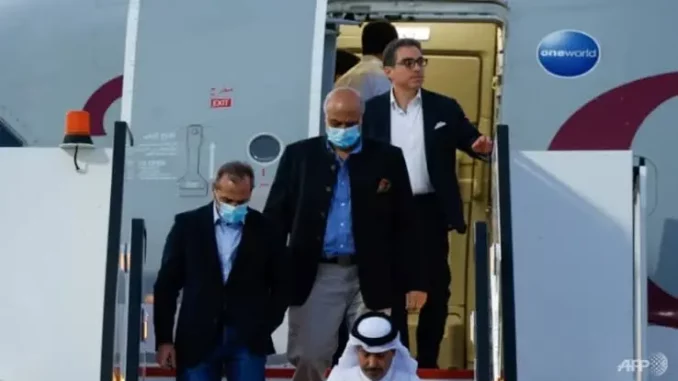
The United States and Iran on Monday swapped five prisoners each in one of the arch-foes’ first deals in years as Tehran gained access to $6 billion in frozen funds.
The five Americans freed by Iran, including one held for eight years, flew out of Tehran in a Qatari jet, hours after the unblocked funds were deposited in accounts also managed by Qatar.
The White House said it was “pleased to confirm” the plane carrying the freed Americans had left Doha, Qatar for the United States, and that President Joe Biden had spoken with the families of the Americans in an “emotional call”.
The five had walked in the setting sun on the tarmac in Doha, three of them with arms around one another’s shoulders.
One of them praised Biden for ignoring the political backlash and taking the “incredibly difficult decisions” that freed them.
“Thank you, President Biden, for ultimately putting the lives of American citizens above politics,” Siamak Namazi, a businessman held since 2015, said in a statement.
Secretary of State Antony Blinken, who spoke to the released Americans by telephone after they landed in Doha, insisted the Biden administration had “no higher priority” than freeing US citizens.
“It’s very good to be able to say that our fellow citizens are free,” Blinken told reporters in New York, where he and Biden are taking part in UN meetings.
Two of the Iranian detainees arrived in Qatar, Iranian media said. The other three released by the United States have opted to remain there or in a third country.
After quiet discussions led in part by Qatar, the two countries completed the exchange after the transfer of $6 billion in funds, frozen by US ally South Korea.
The Biden administration has rejected criticism at home that it is paying “ransom,” insisting the money will be used only humanitarian purposes, with a threat to re-freeze the funds if not.
But Iranian foreign ministry spokesman Nasser Kanani, speaking earlier in Tehran, said the clerical state will have “total access” to the assets.
Political risks for Biden
Biden’s Republican rivals have roundly denounced the deal. Republican Senator Mitt Romney said it would lead to “kidnappings”.
“The idea of basically paying to release, in this effect, a hostage is a terrible idea,” he said.
Mindful of political risks, Biden in a statement said he would “continue to impose costs” on Iran and announced sanctions against former president Mahmoud Ahmadinejad and the country’s intelligence ministry.
The sanctions were imposed over alleged deceit in the disappearance of Bob Levinson, a former FBI agent who disappeared in Iran in mysterious circumstance and is presumed dead.
Biden in his statement did not mention that he granted clemency to five Iranians. A US official said that all were convicted or changed with non-violent crimes, with one already set to be released soon.
Iran had generated the revenue through oil sales. South Korea froze the funds after Biden’s Republican predecessor Donald Trump withdrew from a landmark nuclear accord and imposed unilateral US sanctions on buying oil from Iran.
Iran’s central bank governor said Iran would seek damages from South Korea.
“We’re making a complaint on behalf of Iran against South Korea for not giving access to these funds and the reduction in value of these funds in order to receive damages,” Mohammadreza Farzin said on state television.
The five Americans of Iranian descent — all considered Iranian nationals by Tehran, which rejects dual nationality — were released to house arrest when the deal was agreed last month.
Besides Namazi, they include wildlife conservationist Morad Tahbaz, venture capitalist Emad Sharqi and two others who wished to remain anonymous. All were accused of spying or other crimes that they strongly reject.
Tahbaz also holds UK nationality. Prime Minister Rishi Sunak said Britain was not involved in the deal but that he was “extremely pleased” he was free.
A US official said that two more US citizens flew out of Tehran — Namazi’s mother and Sharqi’s wife, who were not in prison but had ont been allowed to leave.
According to Tehran, the freed Iranians include Reza Sarhangpour and Kambiz Attar Kashani, both accused of violating US sanctions against Tehran.
A third prisoner, Kaveh Lotfolah Afrasiabi, was detained at his home near Boston in 2021 and charged with being an Iranian government agent, according to US officials.
The two others, Mehrdad Moein Ansari and Amin Hasanzadeh, were said to have links to Iranian security forces.